SCUBAPRO Deep Elite Team - Howard & Michele Hall
Howard & Michele Hall
If you've ever watched a documentary on the oceans, chances are good that it was filmed and produced by Howard and Michele Hall. They are legends not just in the diving community, but around the world for their incredible body of work. They've inspired generations of divers, marine biologists, conservationists and explorers. It's hard to believe that a chance encounter in the '70s, when Michele became certified by Howard, her diving instructor, created one of the most powerful aquatic filmmaking couples in history. They have always been and remain committed to SCUBAPRO -- and we remain committed to them for who they are, what they've done and what they will continue to inspire.
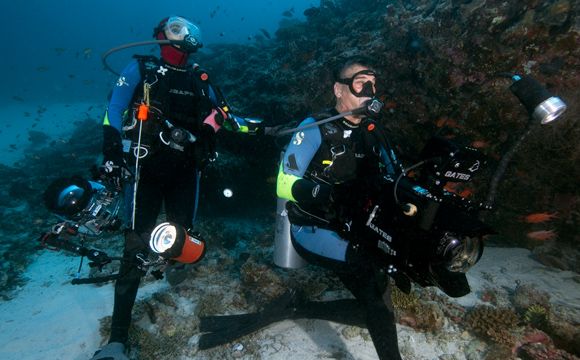
An interview with Howard and Michele Hall:
Tell us about yourself:
Howard: I'm Howard Hall, and I'm a wildlife filmmaker. We specialize primarily in IMAX films these days and mostly marine wildlife behavior and we have been doing that for the last 25 years or so. And I work for her most of the time!
Michele: Not true! It's called Howard Hall Productions and there is a reason for that. I am Michele Hall, a retired nurse. I worked as a nurse for 19 years before getting involved professionally in underwater camera film production, going to work for Howard Hall Productions.
Why did you decide to take the giant stride into the oceans?
Michelle: Certainly for me diving hugely influenced who and what I am. When I was a child, all I wanted to do was become a nurse, and that was my path all through college. I became a registered nurse and then I moved to California and decided to learn how to dive. After meeting Howard and getting certified, I got involved in the periphery of taking underwater stills and being a model for him. When his career took off by the early 90's, he needed some help, so we decided I would change careers and become part of the family business.
Howard: And that's when she became my boss! I have always been a wildlife guy, even when I was a child. I studied marine biology in college and got a Bachelors degree in Biology. I was always looking for ways to use my diving skills and combine that with my knowledge of wildlife - and to explore. By the late 60s, much of the terrestrial environments that were once wild had pretty much been explored. There were very few places you could go and be the first one there except underwater. For me going out and seeing wildlife in pristine environments was really what it was all about, so diving for me was a great way to experience the natural world.
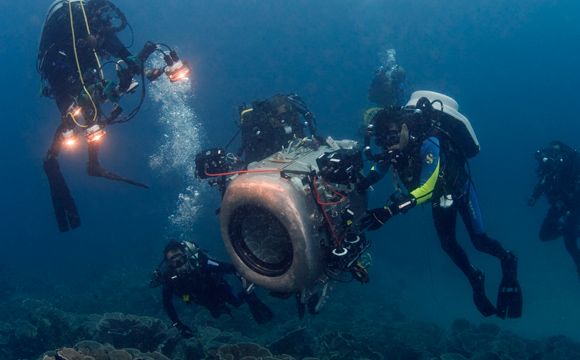
How has diving changed your life?
Michele: Well we started diving independently. Howard has been diving since he was a teenager. When I moved to California and decided that I wanted to have something to share with my boyfriend, I learned how to scuba dive. Howard was my dive instructor, and the rest is history.
Howard: Not very smart dumping her plastic surgeon ex-boyfriend who was making gazillions of dollars a year to marry her diving instructor!
Michele: I was never an outdoor adventurist until I met Howard and started diving. I began exploring nature and saw a vast amount of incredible life in the sea. I feel so privileged to know there is this whole world under the surface that I could experience. That is part of what the fascination is for me with still photography - to be able to show those images to my non-diving friends. It just is such a privilege and it has inspired me to work hard and do a good job of it.
Where is your favorite place to dive?
Howard: I think for me, I am asked that question all the time and until recently I really didn't have a good answer for it, because we have had the chance to dive in so many great places and they are all so very different. But when I think about my very best dives, it very often comes back to diving in Southern California. Now why would those be some of the most important and memorable dives to me? Because that is where I started diving. A good day with good visibility in the kelp brings back memories of where I began and all the emotions that I had when I first learned about this wonderful environment. Even if you're a world-class diver and have traveled everywhere and you've seen everything, you haven't quite seen it all until you have dived in a kelp forest when the visibility is good on a fall day in Southern California. When it is good, it is as good as any place.
Michele: People ask me so often what is your favorite place to dive and my answer is "What is your favorite place to eat?" because it just varies depending on what I'm in the mood for. If I want cold water then British Colombia is fabulous, so is South Australia and California where I started diving. On a good day there is no place better so it's really hard to answer where is the best place!
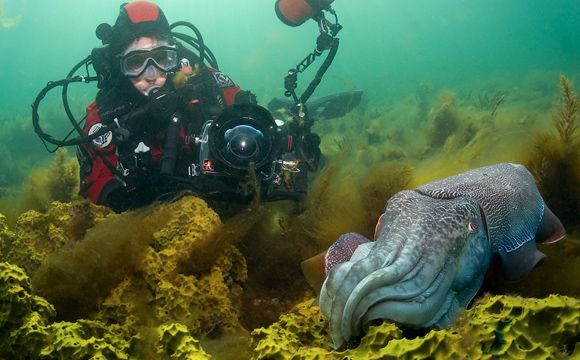
Tell me what, if you had to pick one of the most amazing experiences underwater, what would it be?
Michele: I have had a number of amazing experiences in the water. Sometimes it's a small animal; sometimes it's the big ones. But two wonderful experiences come to my mind just from this past year. Last February I was in Ambon, sitting on a reef in 15ft of water in one spot intently watching this shrimp and this fish maneuver in and out of a hole. The fish would come out and raise his fin and he'd open his mouth. Then his companion shrimp would come out, and they just sort of did this dance - a symbiotic relationship. It was mesmerizing. I sat for over 45 minutes and just thought, "I wish everybody could see this!
Howard: When you're shooting motion picture work, it's very different from shooting still pictures. Things have to happen in front of the camera - and you have limitations trying to compose them. The cinematographer has to anticipate something happening and then hope that it does. So the perfect composition doesn't happen very often. However, I made one dive when I swam down to a pair of whales and they very slowly went into this beautiful ballet that was composed perfectly within the frame. It was totally symmetrical and just one of the most beautiful things that I have ever seen. That kind of experience is just marvelous and it doesn't happen very often. In this case, it was just brilliant.
You've done some amazing things. What are you most proud of?
Howard: We really like the idea that we're making a positive contribution towards conservation and just to the world by making the kinds of films that we do. In general the filmmaking industry doesn't do that. Hollywood film productions are not socially responsible nor socially beneficial. We're involved in the kind of filmmaking that's positive. We really like that. We're proud of the fact that we're doing something. It might not be much, but we're doing something positive.
Michele: What is mind boggling to me is that for at least a couple of decades now, we've had people tell us that they have decided to become marine biologists after watching our films. That their lives have changed and that they have changed their career paths - that sure makes me feel good. We are so lucky to have had that kind of a positive influence and all along to have had a heck of a lot of fun doing it!
Howard: Another thing that we are quite proud of is the fact that when we're out doing film projects we're often very well funded. We have large boats, lots of logistical support and we have the opportunity to spend a great deal of time watching the animals and observing animal behavior - sometimes more opportunity than scientists have. We get to discover things, things that nobody knows about. The films that we've shot and some of the footage that we've captured have been used to write scientific papers and discover new species. Imagine being able to be an explorer in the sense that we're learning and discovering new species and new animal behaviors and learning things that nobody knew about.
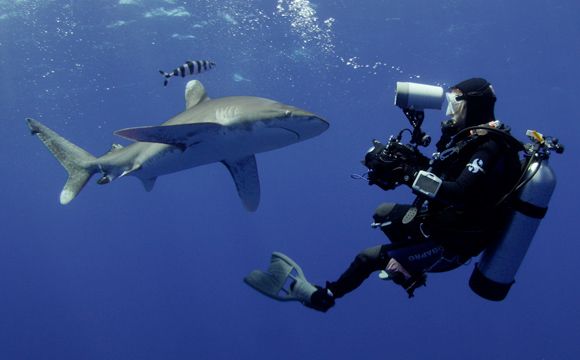
What is your advice to someone who wants to do what you do?
Howard: Well, not surprisingly we get asked that quite often. A lot of people would like to be in the underwater film business and what I usually tell them is do it because you love to do it, not because you're going to make a living out of it or you're going to make money out of it, or so you can quit your day job. It's very difficult to start with a goal to make a living as an underwater filmmaker or underwater photographer but it is possible. If you love it enough and you're willing to spend many years enjoying it and having fun, It is possible that you'll eventually find yourself making a living out of it. That's what happened to me. I never set out to become a professional wildlife cameraman or filmmaker but I just slowly found myself too busy with my photography and eventually my film production to do anything else. I sort of consider myself a snorkel salesman who has been moonlighting as a filmmaker for the past 40 years and as that dries up, I will go back to selling snorkels!
Why should more people dive?
Howard: The fact of the matter is, the more divers in the water with the animals the better it is for the animals themselves. What's going to save the sharks, the whales, the coral reefs, is people getting into the water with them. I think the more people diving, the more people visiting these environments, swimming with these animals, supporting local economies to protect their waters, the better it is. It's simply a matter of economic symbiosis and it has to be encouraged.
Michele: And then there are places like San Benedicto - small island areas not populated with humans. If you didn't have sports divers going out there then the fisherman would come in. It's happened in the past, the fisherman would come in and fish the area out - kill the Manta Rays and kill the Sharks. It is really thanks to the sports diving operations that are out there, not specifically to monitor the area but because they are there, that the fisherman are staying away. They know it is illegal for them to be there but if the sports divers weren't there then the door would just be open for them to do it.
Howard: It's a symbiotic relationship - all the species benefit.
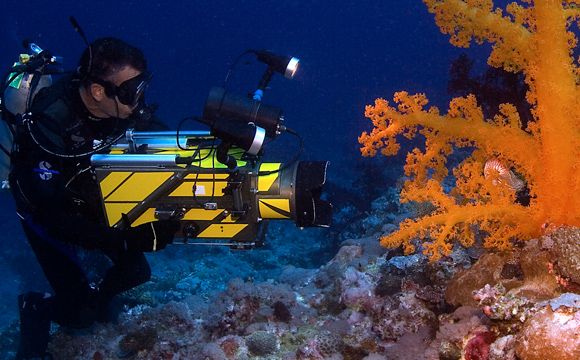
What is the favorite thing in your dive bag?
Howard: The answer to that changes depending on when you ask it, but one of the things that I own, love and am amazed by is the Galileo computer. Not only is it the greatest dive computer that I have ever had, but also it has the best digital compass that I have ever seen. And now that SCUBAPRO is working on tri-mix and constant partial pressure of oxygen, I can't wait to have a Galileo computer that I can use with a rebreather sometime soon.
Michele: I was about to say my Galileo computer as well. I think that if I was dropped into a diving situation and didn't have my gear with me, I could probably find a wetsuit, BC and fins that I could live with, but having my Galileo is essential. I know that I can trust it, I know that it is easy to change the settings, I know where to look for information that I need and it's reliable. if I'm going to make an extended dive, I need to know how long I can stay down or how long I need to stay down.
Why SCUBAPRO?
Michele: I have been diving with Scuba-Pro gear for 37 years, since I started diving. You don't stick with something for that long if it doesn't work for you! So, why do I like SCUBAPRO? Comfort, reliability, and the sizing! I am not a big husky guy; I'm a short, slim girl. Yet both of us can always find something that works for us, something that fits and lasts and keeps us comfortable. I don't want to be thinking about my gear when I am in the water; I want to be thinking about what I am looking at. I need to concentrate on my photography and not worry about whether or not my equipment is going to work for me.
Howard: I bought my first SCUBAPRO regulator in 1966. It was my first regulator, and I remember paying sixty dollars for it, a lot of money to me at the time. I have been diving SCUBAPRO ever since. I have occasionally owned other regulators but not for very long periods of time. I just never have found anything that works as well as their regulators, fins and BCs. I have watched the evolution of the gear and I have watched the equipment improve and SCUBAPRO is still the best. I'm very happy with SCUBAPRO gear; I'm not about to change anytime soon!
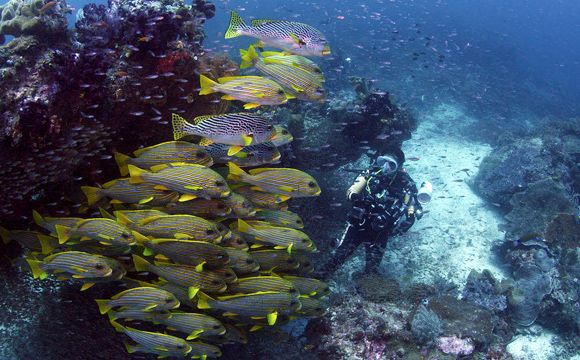
If you could tell us one thing about the oceans, what would it be?
Howard: We need to save the seas, we need to save the sharks, and we need to protect the coral reefs. Since those statements are very en vogue, I would tell people, rather, to just go and have a look. Go and see the ocean. Go free dive, take a diving class, go see a film about marine life and fall in love with the environment. If you see it, you will fall in love with it. You're only going to protect what you know and love and hopefully that will be enough.
Michele: Go now because things are changing. Things are changing worldwide, that's inevitable. We are losing populations in our oceans rapidly. Have a look now so you can enjoy it, and then hopefully you'll want to do something to slow the change.